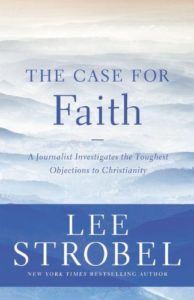Defending the Christian Faith Part 1 – Apologetics Today
Defending the Christian faith was greatly needed in the infant New Testament Church and undoubtedly is still needed today. The defense of biblical truth is necessary because it has been and will always be under attack. Knowing what you believe and why you believe it is important in a world where seemingly everything is challenged. Without knowing biblical truth and how it can be defended, we are more vulnerable to fall prey to the warning in Colossians 2:8.
Colossians 2:8 “Beware lest any man spoil you through philosophy and vain deceit, after the tradition of men, after the rudiments of the world, and not after Christ.”
Christians have the wonderful privilege of responding to challenges raised against the Christian faith and its’ beliefs, which are derived from Scripture. Knowing Scripture and why Scripture is true is essential to defending the Christian faith. This is desperately needed in a world that is so confused about what truth actually is. Our young people, particularly in high school and college, are assaulted on every side by a variety of worldviews; we want to help them be prepared to stand for biblical truth.
1 Peter 3:15 “But sanctify the Lord God in your hearts: and be ready always to give an answer to every man that asketh you a reason of the hope that is in you with meekness and fear:”
Defending the Christian faith is at the very heart of 1 Peter 3:15. The aim and purpose of this document is to highlight the importance of defending biblical truth and to point the reader to helpful resources. These resources present a well-reasoned basis for the Christian faith, defend it against objections, and expose the flaws of other worldviews. For some, the idea of defending the Christian faith may feel new or uncomfortable, but it is encouraged throughout Scripture. One example of this is Acts 17, where Paul challenges the idolatrous Athenians for worshiping false gods and then teaches them the truth.
Acts 17:16-24 “Now while Paul waited for them at Athens, his spirit was stirred in him, when he saw the city wholly given to idolatry. Therefore disputed he in the synagogue with the Jews, and with the devout persons, and in the market daily with them that met with him. Then certain philosophers of the Epicureans, and of the Stoicks, encountered him. And some said, What will this babbler say? other some, He seemeth to be a setter forth of strange gods: because he preached unto them Jesus, and the resurrection. And they took him, and brought him unto Areopagus, saying, May we know what this new doctrine, whereof thou speakest, is? For thou bringest certain strange things to our ears: we would know therefore what these things mean. (For all the Athenians and strangers which were there spent their time in nothing else, but either to tell, or to hear some new thing.) Then Paul stood in the midst of Mars’ hill, and said, Yè men of Athens, I perceive that in all things ye are too superstitious. For as I passed by, and beheld your devotions, I found an altar with this inscription, TO THE UNKNOWN GOD. Whom therefore ye ignorantly worship, him declare I unto you. God that made the world and all things therein, seeing that he is Lord of heaven and earth, dwelleth not in temples made with hands;”
WHY NOW?
Western civilization, which in the past has been known as predominately Christian, is being influenced by contrary worldviews (i.e. Eastern Religions, Agnosticism and Atheism) as never before. These worldviews either believe in a god(s) other than the God of the Bible or do not believe God even exists. Knowing what we believe and why we believe it is true can be helpful to recognize the influences of these worldviews and how to respond to them. If we as God’s children do not help defend truth, who will? The void that is left when biblical truth is not taught and defended causes much hurt and confusion. Not only do we, as believers, desire to teach truth to a hurting world, we also want to equip others (especially our children) to stand against the “wiles of the devil”. Satan seeks to destroy all and in our current culture he has been effectively using lies to undermine the faith of many. Now is the time to stand for and defend biblical truth.
God’s command to Israel was to teach their children that which they themselves had learned and held in their hearts.
Deuteronomy 6:7 “…thou shalt teach them diligently unto thy children, and shalt talk of them when thou sittest in thine house, and when thou walkest by the way, and when thou liest down, and when thou risest up.”
Jesus gave the main reason for defending the truth of Christianity in declaring that He alone is the way, truth, life, and that no one can come to God except by Him (John 14:6). How can we know him as Truth without being taught through Spirit-led study? Likewise, how can we adequately defend the truth without knowledge of it?
The Apostle Paul reminded the Romans that everything written in the Word was for their learning. They needed to apply themselves so they could be exhorted from the Scriptures and have confidence through abiding in Christ. In addition, Paul challenged Timothy to study the Word so that he could discern the truth.
Romans 15:4 “For whatsoever things were written aforetime were written for our learning, that we through patience and comfort of the scriptures might have hope.”
2 Timothy 2:15 “Study to shew thyself approved unto God, a workman that needeth not to be ashamed, rightly dividing the word of truth.”
To view the complete PDF and an annotated bibliography of recommended resources, click here.
Further Information:
 The Case for Faith
The Case for Faith ![]()
The Case for Faith Student Edition (Ages 13-17)
The Case for Faith for Kids (Ages 8-12)
Author: Lee Strobel
As a former atheist, the author conducts interviews with many to investigate why a loving God would allow suffering and evil and could condemn souls to hell. He weaves together a convincing argument for having faith in God and Jesus Christ his Son as Lord and Savior. He discredits the theory of evolution and provides solid support for faith in a Creator. His approach in the book is to take a statement of doubt and expose the fallacies of it, effectively leading the reader to a greater confidence in choosing to believe. In fact, the author’s conclusion is that it takes more faith to not believe in God than to simply accept His sovereignty.
 5 Minute Apologist
5 Minute Apologist ![]()
Author: R. Cornish
5 Minute Apologist provides a brief overview of several important areas of apologetics. This book is meant to help equip the believer with a quick understanding of important areas that are often questioned in the Christian faith. Areas covered are as follows: Recognizing and defending truth in thinking; logic and philosophy; understanding what worldviews, other religions and cults are and recognizing how they differ from a Biblical Worldview; identifying questions, confusion, and arguments about the Bible, God, Jesus, the resurrection, and miracles and finding truthful ways to address them; and understanding common questions and arguments from the scientific world and revealing what is true in science and what is not.
Apologetic Podcast Series ![]()
Christian apologetics is the discipline of making a defense for the Christian faith. Apologetics, therefore, has an important place in the life of a believer. But what place does it have? Does our faith rest on the sum total of a bunch of rational arguments? Or do the arguments rest on our faith in God and thereby give rise to worship? Listen to this 3-part podcast series from Breaking Bread.
Apologetics Conference
The Apologetics Committee of the ETR exists to raise awareness of what apologetics is, why it matters, and provide entryways into major apologetic questions. Every year the Apologetics Committee of ETR hosts a conference, visit the ETR website to view past conference and information on upcoming conferences.





Comments
Leave a Comment